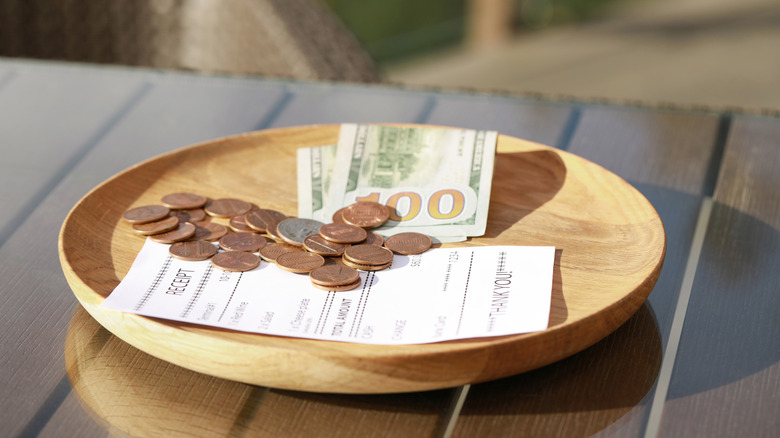Rick Steves' Warning: Tipping Mistakes To Avoid In Europe
Rick Steves points out, in his Europe Travel Blog, that tipping, while second nature in the U.S., can come across as overly generous in many European locations. In places like France and Italy — two countries with tourist attractions worth splurging on — the bill often already includes a service charge. In cities like Rome and Paris, it's common for locals to leave nothing at all. Look for phrases like "service compris" in France or "servizio incluso" in Italy. If you spot those, there's no pressure to tip, but rounding up the total or leaving a few coins as a thank-you is always appreciated. That said, skipping the tip entirely won't raise eyebrows.
Lonely Planet notes that tipping between 5% and 10% usually isn't needed, unless the bill clearly says that a service charge isn't included. Leaving a 15% to 20% tip, as many Americans are used to doing, can feel out of place or even a bit awkward for your hosts. That is because, in much of Europe, service staff aren't relying on tips to make a living. Rick Steves explains that tipping in Europe is more about appreciation, rather than obligation. Leaving a small, quiet tip, when it makes sense, shows you understand local habits — and helps you avoid overpaying simply out of habit.
Tipping taxis, cafés, and bars
Outside restaurants, tipping service workers in Europe often feels unnecessary, and sometimes out of place. Rick Steves points out that cab drivers usually prefer a simple round-up rather than a percentage. In cities like Amsterdam, offering a big tip might even cause confusion, which some drivers may politely turn down.
Baristas and bartenders across much of Europe don't expect tips, unless they're offering full table service, per Travel + Leisure's 2024 tipping guide. At a café where you pay at the counter, the total on your bill is usually the end of it. Locals might leave a few coins, but that's it. With that said, dropping a large tip for a quick espresso won't turn heads, but it'll just cost you more without adding any real charm. Instead of juggling calculations for a tip, learn Rick Steves' secret trick to lower your café bill in France.
While a usual 20% tip might feel routine, when you apply it to every drink, cab ride, or café stop, it can quietly eat into your daily travel budget and overall financial health. Especially as you might already be spending a lot of your income on your vacation. Remember that being smart about tipping doesn't mean you are stingy. In Europe, it means you know when a small gesture is enough, and when to keep things polite, practical, and in tune with the local culture.
Relying on cards or U.S. dollars instead of local cash
Rick Steves also points out that in many small hotels, cafés, and family-run spots across Europe, tipping by card often isn't possible, even if the card worked just fine for your main purchase. In these moments, having a few smaller denomination coins on hand can save you from an awkward conversation, or the hassle of tipping with a bill that's too large. It's a simple way to stay prepared without overdoing it.
Steves also notes that many small businesses still prefer cash. That's often because they can't easily process digital tips or divide card payments between staff. In some hotels and restaurants, you might even see tip envelopes left out as a quiet nudge to use cash if you choose to leave something.
Also, The Times warns against tipping in U.S. dollars. It disrupts local cash flow, and creates a hassle for the person receiving it. They might have to find a place to exchange the money, often at a cost, or simply turn it down, especially if the bills are small, damaged, or unfamiliar. If you can afford to tip, use local currency to keeps things simple and respectful.


